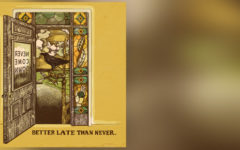
Given her recent kudos by the IBMA as the first woman to win their award for Guitar Player of the Year, and kudos for Song of the Year at the recent Folk Alliance International confab in Kansas City, Molly Tuttle seems easily on track to also become the breakout artist of 2018. There’s already an enormous buzz surrounding her, and prospects are good that she’s going to attract continued notice in the months ahead. Indeed, Rise, her first solo effort, garnered a release on Compass Records, no slouch when it comes to procuring the best bluegrass artists currently ascending on today’s scene.
Of course, Tuttle’s not exactly a newcomer, although her recent recognition belies that fact considerably. Adept on banjo as well as guitar, and a superb singer, songwriter and instructor to boot, she began playing at the tender age of eight, and by the time she turned 15, she was performing with her family band, the aptly-named Tuttles. They have two albums to their credit (2011’s Introducing the Tuttles and Endless Ocean, released two years later, as well as The Old Apple Tree, which Molly recorded with her dad Jack when she was only 13), but Molly can also claim her share of the kudos, courtesy of scholarships at the prestigious Berklee College of Music, and various other honors that include wins at Merlefest and an earlier acknowledgement from IBMA.
Likewise, she’s already chalked up an impressive catalogue courtesy of her all-girl band the Goodbye Girls and a duo album she recorded with fiddler John Mailander.
Mailander also appears on Rise, her first true solo outing, along with several other notable names, including Darrell Scott, bassist Todd Phillips, banjo player Wesley Corbett, and backing vocalists Kai Welch and Kathy Kallick. However, make no doubt — Rise is clearly Tuttle’s triumph. She not only wrote all the songs — including You Didn’t Call My Name, the one that reaped recognition from Folk Alliance, as well as Friend and a Friend, a stunning co-write with Korby Lenker — but her masterful musicianship and supple vocals bring each of the seven songs to the fore. Indeed, the propulsive Friend and a Friend already sounds like a standard, making one swear they’ve heard it before the groove run out.
Still, it’s not the only standout — not by a long shot. Opening track Good Enough invites attention at the outset, courtesy of its frenzied fiddle work, Tuttle’s sublime singing and ernest intent. The mellow caress of the aforementioned You Didn’t Call My Name more than justifies ample attention, while the folkish Lightening in a Jar and Walden, the album’s sweet send-off, reinforce the tender tones. Subtlety is Tuttle’s clear reserve; the quietly intent Save This Heart is incisive yet supple in its delivery, while the all-instrumental Super Moon gives Tuttle ample opportunity to show off her peerless flat picking while allowing others in her ensemble opportunity to underscore her efforts.
Ultimately, despite its abbreviated seven song setlist, Rise accomplishes all its title suggests — that is, to provide a platform for an artist who has already ascended to certain prominence, her relative youth notwithstanding. It not only elevates her stature, but affirms her artistic inclinations as well.







